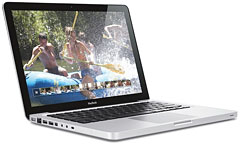"The Apple Tax" was a brief MIcrosoft
campaign to paint Apple as too expensive. Since then, the
discussion has made the rounds on various sites discussing the merits
of this idea. Many are trying to show that for a comparable computer,
the Mac isn't all that much more expensive.
What an original idea that is.
However, all this discussion is missing is the simple question: "So
what if they are?"
What if Macs really do cost more? What are you going to do about
it?
Bloggers tried with all their reports of an $800 laptop to predict
that Apple would cut prices. Apple showed them what they thought of
that idea. Apple's lowest
cost notebook starts at $999. That is $199 away from what people
claimed Apple should do.
Arrogance?
Is it arrogance or hubris for Apple to think that it can continue to
sell high dollar computers?
Seeing Apple's Q4-08 report, it looks like Apple is fully capable of
selling in this price range; neither arrogance or hubris is running the
show. The facts are out there: Price alone is not the enemy of
sales.
What mojo does Apple have that Dell and HP wish they had?
Apple is compared to other premium brands like BMW all the time, but
I saw one that makes more sense. Apple is more like Toyota: Toyota
isn't a luxury brand. Toyota cars are selling in large numbers and have
a slightly higher price.
How does Toyota do it? It works on improving the value of their
cars.
Value
Value is the perception of benefits relative to the price paid. The
perception of value will drop if you don't maintain the quality of all
the little details.
When I opened my Mac Pro to
install RAM, I saw that it is just as refined on the inside as outside.
That didn't increase the processor speed. It doesn't help protect
against computer viruses. At most the clean design may help with
airflow, but that attention to detail tells me that someone took more
time designing my computer than a Dell workstation.
 The value of the new MacBook and MacBook Pro is not the
amount of hard drive space or processor speed or installed RAM, it is
the total attention to construction. I supervise a tooling shop with
CNC machining. I know what is involved in machining the new cases for
the MacBooks.
The value of the new MacBook and MacBook Pro is not the
amount of hard drive space or processor speed or installed RAM, it is
the total attention to construction. I supervise a tooling shop with
CNC machining. I know what is involved in machining the new cases for
the MacBooks.
First off, that type of machining is accurate to within 0.001" or
better. Why a laptop case would need that kind of precision is beyond
me, but every bolt hole holding that case together will match perfectly
every time.
Second, milling is much, much slower than injection molding. A
molded plastic part is complete in under a minute, often much less. The
same is true of stamped sheet metal parts. Milling everything out of
one block of aluminum will take minutes to hours for completion. That
case is probably one of the most expensive things included with the new
MacBook - yet Apple made that kind of leap in quality with almost no
change in price.
Take it from me: Be impressed.
Milling Aluminum Isn't Cheap
Are we going to see $400 laptops from Asus or Dell using the same
unibody construction? Hell no! The case alone may cost $100-200 (that
is a guesstimate on price), and there are still a lot more parts to add
to the computer to finish it off. No one would pay a premium for a Dell
made that way unless Dell sneaks it into a $3,000 gaming laptop.
I think Apple has answered the question about the Apple Tax with the
latest MacBooks. The answer is that no one else is offering the quality
of computer construction that Apple offers in the same price range.
When you walk into your favorite coffee shop with one of these under
your arm, you won't have people snickering about how much more you
paid. Instead, they will be craning their necks to get a look at how
darn good it is.
You can value that any way you want in making your next computer
purchase, but just like Toyota, the quality of the car is at least as
important as the sticker price. 

 The value of the
The value of the 
